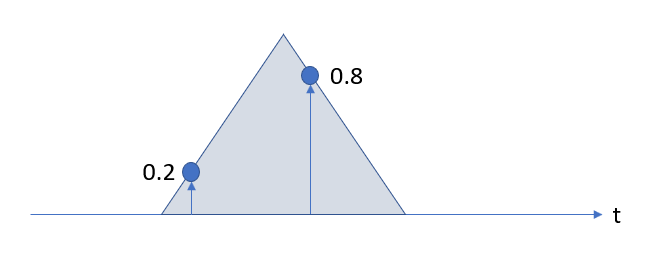I'm trying to understand interpolation in discrete time. We know that for linear interpolation we use h(t)=triangle waveform. When we talk about linear interpolation in discrete time, I'm using expression=$x(n-1) + (x(n) -x(n-1)) \cdot u$. Where $u$ is the value between $2$ input samples. It is between $0$ and $1$.
For such kind of system, to calculate impulse response, I gave impulse input($1$ followed by lot of $0$'s). Here I have kept $u=0.2$. The output I got is $0.2$, $0.8$. The expectation was a triangle. Because we know theoretically that's the interpolating function I used. Where am i not thinking right here? May be the way discrete time impulse response works? Although in time domain it interpolates correctly.

